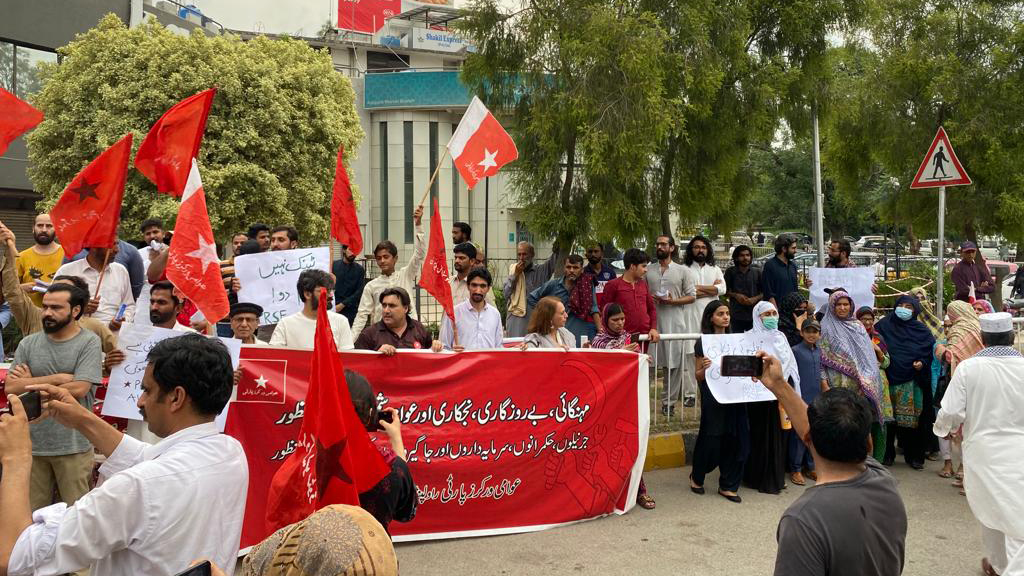On Sunday June 12, the Awami Workers Party (AWP), a left-wing political party in Pakistan, and the student group Progressive Students Against Federation (PrSF) held protests in the national capital, Islamabad, against spiraling inflation in the country.
Scores of students, workers, women and residents of Islamabad joined in protest at Aabpara Chowk, Islamabad to demand people’s right to a dignified life, with guarantees to employment, education, and health. Protesters also demanded economic relief for working people, an increase in local production capacity, and a progressive taxing system in the country.
Every day costs are piling up for Anser Mai, who works as a domestic helper in Pakistan, as economists fear the country’s current inflation rates will push low-income earners into poverty pic.twitter.com/H7reo14ZLK
— Reuters (@Reuters) June 8, 2022
Protestors raised slogans against inflation and the anti-people policies of the International Monetary Fund (IMF). The national government, led by Shehbaz Sharif, is adopting drastic measures to convince international lending authority for a bailout package.
After the conclusion of talks between the government and IMF in the first week of June, Finance Minister Miftah Ismail announced a 17% hike in petrol and diesel prices for consumers, raising the current prices up by 30 rupees per liter. Islamabad has sealed a deal with IMF for an immediate disbursement of USD 900 million, as its forex reserves fell below USD 10 billion as of June 3, only enough to cover less than two months of imports.
At Sunday’s protest, columnist and AWP’s Deputy General Secretary Aasim Sajjad Akhtar called out Ismail for the recent hikes in petroleum prices imposed on the poor by the elite, who refuse to reduce their own consumption.
Pakistan’s economic crisis
Pakistan saw inflation rates spiking to their highest in two years this May as the economy staggered, with rising fuel prices and weakening currency. Consumer prices have risen by 13.8% compared to the previous year, according to the official data released by the government. However, many believe the real inflation figures to be even higher.
On Monday, June 13, the State Bank of Pakistan (SBP), announced that the Pakistani rupee fell to an all-time low of Rs 203.86 per dollar this week.
The IMF Resident Chief in Pakistan, Esther Perez Ruiz, expressed dissatisfaction and the need for “additional measures” regarding the country’s latest steps to stabilize the economy.
PTUDC protested against IMF's dictated #budget2022. Protestors chanted slogans against IMF & soaring inflation in country. #GetOutIMF pic.twitter.com/P7ndzjEtpR
— Pakistan Trade Union Defence Campaign (Official) (@ptudcofficial) June 12, 2022
The Sharif government unveiled a 9.5 trillion Pakistani rupee ($47.12 billion) budget for 2022-23 on June 10, aiming at tight fiscal consolidation in a bid to convince the IMF to restart bailout payments. Launching Budget 2022, Ismail declared that the government will impose 2 percent additional tax on individuals with an annual income of 30 million rupees or more. The government has also imposed a ban on officials from buying cars for personal or official use in order to reduce fuel consumption.
Pakistan faces a total of USD 6.4 billion in debt due over the next three years as the newly-elected Prime Minister Shehbaz Sharif’s new government tries to avoid a default. According to data from 13 countries compiled by Bloomberg, Pakistan is the worst performer in Asia, with its rupee dropping by almost 8% in the last month. The economy has been pushed to the edge of crisis following months of political chaos that led to the exit of Imran Khan’s previous government.





